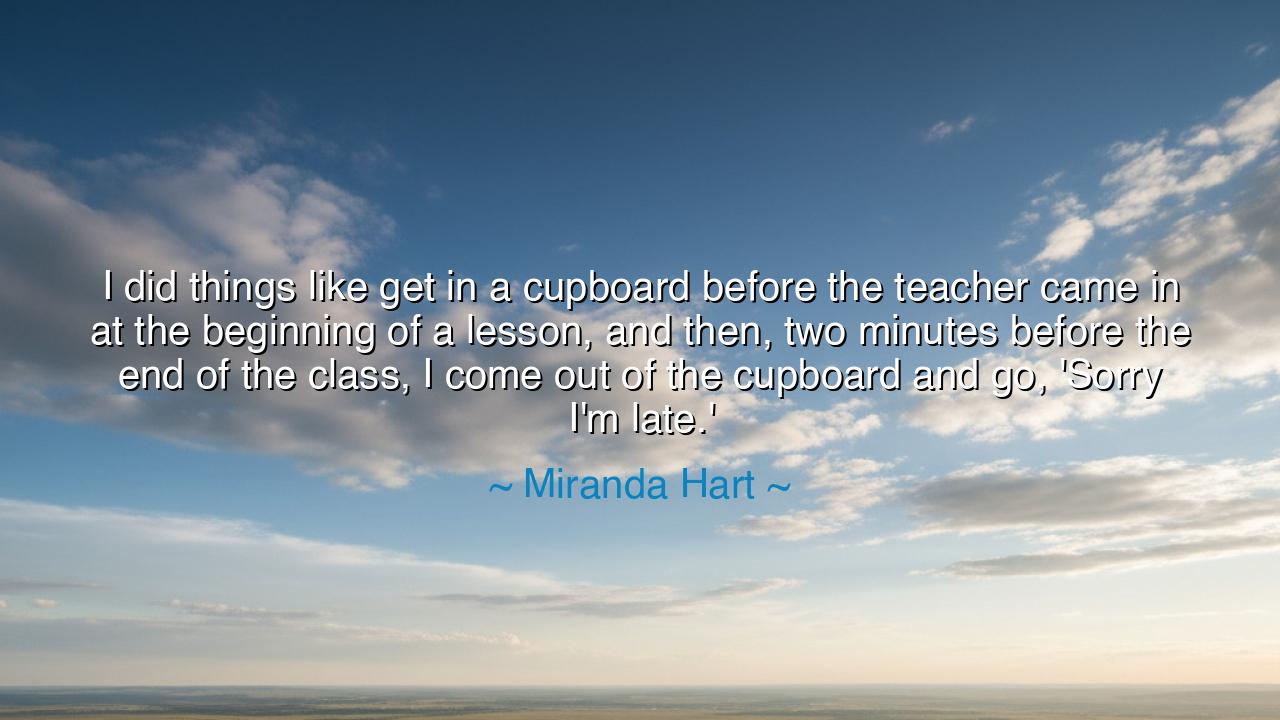
I did things like get in a cupboard before the teacher came in
I did things like get in a cupboard before the teacher came in at the beginning of a lesson, and then, two minutes before the end of the class, I come out of the cupboard and go, 'Sorry I'm late.'






Hear the playful recollection of Miranda Hart, who declared with laughter in her voice: “I did things like get in a cupboard before the teacher came in at the beginning of a lesson, and then, two minutes before the end of the class, I come out of the cupboard and go, ‘Sorry I’m late.’” At first, these words seem like simple humor, a tale of childish mischief retold by a comedian. But within them lies a deeper truth about the human spirit: that joy, laughter, and subversion have always been companions to learning, and that the spark of playfulness can teach lessons as profound as any text.
The essence of her words lies in the courage to be different. For many students, the classroom is a place of silence, rules, and conformity. To step into a cupboard and reappear with a joke is to challenge the expected, to create laughter where there might otherwise be monotony. Hart’s act is a reminder that even in places of order, the soul hungers for delight, and that the gift of humor can transform dullness into memory.
This truth is as old as history itself. In the courts of kings, the jester was often the only one who could speak truth to power—cloaking wisdom in laughter so that it might be heard without punishment. In monasteries, where solemnity reigned, moments of play and gentle mischief were often recorded as necessary breaks for the spirit. And in every age, the classroom has seen not only diligent scholars but also those who remind us that to learn is not merely to endure but to live, and to laugh.
Consider also how humor, when used with love, can disarm tension and open hearts. A stern teacher may enforce obedience, but the teacher who laughs with their pupils creates loyalty. The class clown, though sometimes disruptive, often serves the hidden role of keeping spirits alive. Hart’s tale, exaggerated though it may be, points to this larger truth: that laughter in learning is not an enemy but an ally. It binds people together, it lifts the weight of fear, and it transforms lessons into experiences that endure.
Yet, there is also wisdom in the risk she describes. To climb into a cupboard is to risk discovery, to risk punishment. It is the mark of the creative spirit: to test boundaries, to embrace embarrassment, to trust that the joy created is worth the risk. Without such daring, the world would stagnate in rigid seriousness. Many of the greatest figures in art and invention carried this same mischievous spirit, unafraid to step outside the rules in order to show the world something new.
The lesson, then, is this: do not be afraid of laughter, and do not scorn the playful. Where others see foolishness, there may be creativity, resilience, and courage. The world needs its jokers as much as its scholars, for joy is a kind of wisdom, and humor is a form of truth. To live fully is to balance seriousness with levity, to know when to study in silence and when to burst forth from the cupboard with a joke that sets hearts alight.
Practical steps follow: in your own life, allow room for humor. Do not silence the playful part of yourself for fear of judgment. Share laughter with others, especially in places weighed down by duty or expectation. If you are a teacher, embrace humor as a tool for connection. If you are a student, remember that joy itself can be a lesson, teaching resilience and courage.
Remember always: the cupboard is not only a place of hiding, but also a place of rebirth. From it, one may emerge late yet triumphant, bearing laughter as a gift to others. Miranda Hart’s story is more than mischief—it is a parable of the human need for joy, and a reminder that sometimes the greatest lessons are not in the books on the desk, but in the laughter that fills the room.






AAdministratorAdministrator
Welcome, honored guests. Please leave a comment, we will respond soon